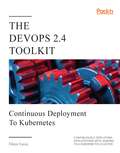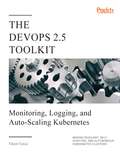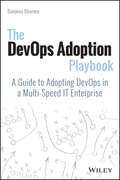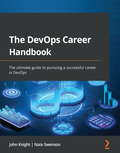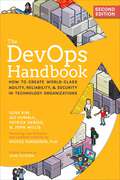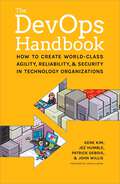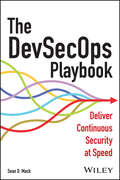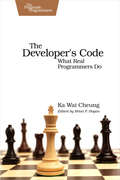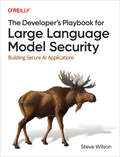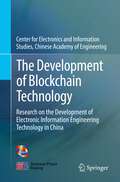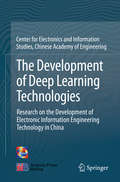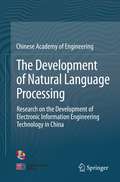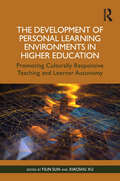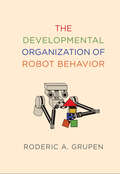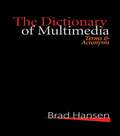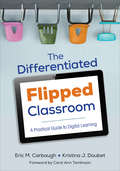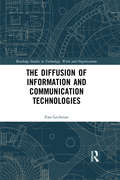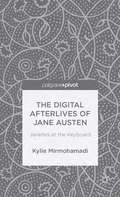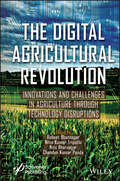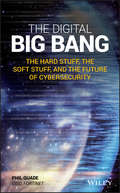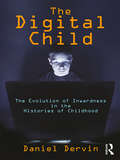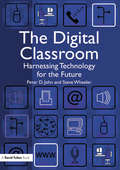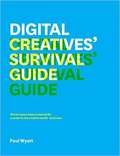- Table View
- List View
The DevOps 2.4 Toolkit: Continuous Deployment to Kubernetes: Continuously deploying applications with Jenkins to a Kubernetes cluster (The\devops Toolkit Ser.)
by Viktor FarcicAn exploration of continuous deployment to a Kubernetes cluster, using a wide range of Kubernetes platforms with instructions on how to develop a pipeline on a few of the most commonly used CI/CD platforms. Key Features The fifth book of DevOps expert Viktor Farcic's bestselling DevOps Toolkit series, with a discussion of the difference between continuous delivery vs. continuous deployment, and which is best for the user Guides readers through the continuous deployment process using Jenkins in a Kubernetes cluster Provides an overview of the best practices for building, testing, and deploying applications through fully automated pipelines. Book Description Building on The DevOps 2.3 Toolkit: Kubernetes, Viktor Farcic brings his latest exploration of the Docker technology as he records his journey to continuously deploying applications with Jenkins into a Kubernetes cluster. The DevOps 2.4 Toolkit: Continuously Deploying Applications with Jenkins to a Kubernetes Cluster is the latest book in Viktor Farcic's series that helps you build a full DevOps Toolkit. This book guides readers through the process of building, testing, and deploying applications through fully automated pipelines. Within this book, Viktor will cover a wide-range of emerging topics, including an exploration of continuous delivery and deployment in Kubernetes using Jenkins. It also shows readers how to perform continuous integration inside these clusters, and discusses the distribution of Kubernetes applications, as well as installing and setting up Jenkins. Work with Viktor and dive into the creation of self-adaptive and self-healing systems within Docker. What you will learn Gain an understanding of continuous deployment Learn how to build, test, and deploy applications into Kubernetes Execute continuous integration inside containers Who this book is for Readers with an intermediate level understanding of Kubernetes and hands-on experience.
The DevOps 2.5 Toolkit: Monitoring, Logging, and Auto-Scaling Kubernetes: Making Resilient, Self-Adaptive, And Autonomous Kubernetes Clusters (The\devops Toolkit Ser.)
by Viktor FarcicAn advanced exploration of the skills and knowledge required for operating Kubernetes clusters, with a focus on metrics gathering and alerting, with the goal of making clusters and applications inside them autonomous through self-healing and self-adaptation. Key Features The sixth book of DevOps expert Viktor Farcic's bestselling DevOps Toolkit series, with an overview of advanced core Kubernetes techniques,-oriented towards monitoring and alerting. Takes a deep dive into monitoring, alerting, logging, auto-scaling, and other subjects aimed at making clusters resilient, self-sufficient, and self-adaptive Discusses how to customise and create dashboards and alerts Book Description Building on The DevOps 2.3 Toolkit: Kubernetes, and The DevOps 2.4 Toolkit: Continuous Deployment to Kubernetes, Viktor Farcic brings his latest exploration of the Docker technology as he records his journey to monitoring, logging, and autoscaling Kubernetes. The DevOps 2.5 Toolkit: Monitoring, Logging, and Auto-Scaling Kubernetes: Making Resilient, Self-Adaptive, And Autonomous Kubernetes Clusters is the latest book in Viktor Farcic's series that helps you build a full DevOps Toolkit. This book helps readers develop the necessary skillsets needed to be able to operate Kubernetes clusters, with a focus on metrics gathering and alerting with the goal of making clusters and applications inside them autonomous through self-healing and self-adaptation. Work with Viktor and dive into the creation of self-adaptive and self-healing systems within Kubernetes. What you will learn Autoscaling Deployments and Statefulsets based on resource usage Autoscaling nodes of a Kubernetes cluster Debugging issues discovered through metrics and alerts Extending HorizontalPodAutoscaler with custom metrics Visualizing metrics and alerts Collecting and querying logs Who this book is for Readers with an advanced-level understanding of Kubernetes and hands-on experience.
The DevOps Adoption Playbook: A Guide to Adopting DevOps in a Multi-Speed IT Enterprise
by Sanjeev SharmaAchieve streamlined, rapid production with enterprise-level DevOps Awarded DevOps 2017 Book of the Year, The DevOps Adoption Playbook provides practical, actionable, real-world guidance on implementing DevOps at enterprise scale. Author Sanjeev Sharma heads the DevOps practice for IBM; in this book, he provides unique guidance and insight on implementing DevOps at large organizations. Most DevOps literature is aimed at startups, but enterprises have unique needs, capabilities, limitations, and challenges; "DevOps for startups" doesn't work at this scale, but the DevOps paradigm can revolutionize enterprise IT. Deliver high-value applications and systems with velocity and agility by adopting the necessary practices, automation tools, and organizational and cultural changes that lead to innovation through rapid experimentation. Speed is an advantage in the face of competition, but it must never come at the expense of quality; DevOps allows your organization to keep both by intersecting development, quality assurance, and operations. Enterprise-level DevOps comes with its own set of challenges, but this book shows you just how easily they are overcome. With a slight shift in perspective, your organization can stay ahead of the competition while keeping costs, risks, and quality under control. Grasp the full extent of the DevOps impact on IT organizations Achieve high-value innovation and optimization with low cost and risk Exceed traditional business goals with higher product release efficiency Implement DevOps in large-scale enterprise IT environments DevOps has been one of IT's hottest trends for the past decade, and plenty of success stories testify to its effectiveness in organizations of any size, industry, or level of IT maturity, all around the world. The DevOps Adoption Playbook shows you how to get your organization on board so you can slip production into the fast lane and innovate your way to the top.
The DevOps Career Handbook: The ultimate guide to pursuing a successful career in DevOps
by John Knight Nate SwensonExplore the diverse DevOps career paths and prepare for each stage of the interview process with collective wisdom from DevOps experts and interviews with DevOps Practitioners Key FeaturesNavigate the many career opportunities in the field of DevOpsDiscover proven tips and tricks from industry experts for every step of the DevOps interviewSave both time and money by avoiding common mistakes in your interviewsBook DescriptionDevOps is a set of practices that make up a culture, and practicing DevOps methods can make developers more productive and easier to work with. The DevOps Career Handbook is filled with hundreds of tips and tricks from experts regarding every step of the interview process, helping you save time and money by steering clear of avoidable mistakes.You'll learn about the various career paths available in the field of DevOps, before acquiring the essential skills needed to begin working as a DevOps professional. If you are already a DevOps engineer, this book will help you to gain advanced skills to become a DevOps specialist. After getting to grips with the basics, you'll discover tips and tricks for preparing your resume and online profiles and find out how to build long-lasting relationships with the recruiters. Finally, you'll read through interviews which will give you an insight into a career in DevOps from the viewpoint of individuals at different career levels.By the end of this DevOps book, you'll gain a solid understanding of what DevOps is, the various DevOps career paths, and how to prepare for your interview.What you will learnUnderstand various roles and career paths for DevOps practitionersDiscover proven techniques to stand out in the application processPrepare for the many stages of your interview, from the phone screen to taking the technical challenge and then the onsite interviewNetwork effectively to help your career move in the right directionTailor your resume to specific DevOps rolesDiscover how to negotiate after you've been extended an offerWho this book is forThis book is for DevOps professionals looking to take the next step in their career, engineers looking to make a career switch, technology managers who want to understand the complete picture of the DevOps landscape, and anyone interested in incorporating DevOps into their tech journey.
The DevOps Handbook: How to Create World-Class Agility, Reliability, & Security in Technology Organizations
by Jez Humble John Willis Gene Kim Patrick Debois Nicole ForsgrenThis award-winning and bestselling business handbook for digital transformation is now fully updated and expanded with the latest research and new case studies!&“[The DevOps Handbook] remains a must-read for any organization seeking to scale up its IT capability and expand DevOps practices across multiple departments or lines of business.&” —Mike Perrow, TechBeaconFor years, The DevOps Handbook has been the definitive guide for taking the successes laid out in the bestselling The Phoenix Project and applying them in any organization. Now, with this fully updated and expanded edition, it's time to take DevOps out of the IT department and apply it across the full business.Technology is now at the core of every company, no matter the business model or product. The theories and practices laid out in The DevOps Handbook are tools to be used by anyone from across the organization to create joy and succeed in the marketplace. The second edition features 15 new case studies, including stories from Adidas, American Airlines, Fannie Mae, Target, and the US Air Force. In addition, renowned researcher and coauthor of Accelerate, Dr. Nicole Forsgren, provides her insights through new and updated material and research. With over 100 pages of new content throughout the book, this expanded edition is a must read for anyone who works with technology.&“[The DevOps Handbook is] a practical roadmap to improving IT in any organization. It's also the most valuable book on software development I've read in the past 10 years.&” —Adam Hawkins, software developer and host of the podcast SmallBatches
The DevOps Handbook: How to Create World-Class Agility, Reliability, and Security in Technology Organizations
by Jez Humble John Willis Gene Kim Patrick DeboisIncrease profitability, elevate work culture, and exceed productivity goals through DevOps practices.More than ever, the effective management of technology is critical for business competitiveness. For decades, technology leaders have struggled to balance agility, reliability, and security. The consequences of failure have never been greater—whether it's the healthcare.gov debacle, cardholder data breaches, or missing the boat with Big Data in the cloud.And yet, high performers using DevOps principles, such as Google, Amazon, Facebook, Etsy, and Netflix, are routinely and reliably deploying code into production hundreds, or even thousands, of times per day.Following in the footsteps of The Phoenix Project, The DevOps Handbook shows leaders how to replicate these incredible outcomes, by showing how to integrate Product Management, Development, QA, IT Operations, and Information Security to elevate your company and win in the marketplace.
The DevSecOps Playbook: Deliver Continuous Security at Speed
by Sean D. MackThe DevSecOps Playbook An essential and up-to-date guide to DevSecOps In The DevSecOps Playbook: Deliver Continuous Security at Speed, the Chief Information and Information Security Officer at Wiley, Sean D. Mack, delivers an insightful and practical discussion of how to keep your business secure. You’ll learn how to leverage the classic triad of people, process, and technology to build strong cybersecurity infrastructure and practices. You’ll also discover the shared responsibility model at the core of DevSecOps as you explore the principles and best practices that make up contemporary frameworks. The book explains why it’s important to shift security considerations to the front-end of the development cycle and how to do that, as well as describing the evolution of the standard security model over the last few years and how that has impacted modern cybersecurity. A must-read roadmap to DevSecOps for practicing security engineers, security leaders, and privacy practitioners, The DevSecOps Playbook will also benefit students of information technology and business, as well as governance, risk, and compliance specialists who want to improve their understanding of cybersecurity’s impact on their organizations.
The Developer's Code: What Real Programmers Do (Oreilly And Associate Ser.)
by Ka Wai CheungYou're already a great coder, but awesome coding chops aren't always enough to get you through your toughest projects. You need these 50+ nuggets of wisdom. Veteran programmers: reinvigorate your passion for developing web applications. New programmers: here's the guidance you need to get started. With this book, you'll think about your job in new and enlightened ways.The Developer's Code isn't about the code you write, it's about the code you live by.There are no trite superlatives here. Packed with lessons learned from more than a decade of software development experience, author Ka Wai Cheung takes you through the programming profession from nearly every angle to uncover ways of sustaining a healthy connection with your work.You'll see how to stay productive even on the longest projects. You'll create a workflow that works with you, not against you. And you'll learn how to deal with clients whose goals don't align with your own. If you don't handle them just right, issues such as these can crush even the most seasoned, motivated developer. But with the right approach, you can transcend these common problems and become the professional developer you want to be.In more than 50 nuggets of wisdom, you'll learn:Why many traditional approaches to process and development roles in this industry are wrong - and how to sniff them out.Why you must always say "no" to the software pet project and open-ended timelines.How to incorporate code generation into your development process, and why its benefits go far beyond just faster code output.What to do when your client or end user disagrees with an approach you believe in.How to pay your knowledge forward to future generations of programmers through teaching and evangelism.If you're in this industry for the long run, you'll be coming back to this book again and again.
The Developer's Playbook for Large Language Model Security: Building Secure AI Applications
by Steve WilsonLarge language models (LLMs) are not just shaping the trajectory of AI, they're also unveiling a new era of security challenges. This practical book takes you straight to the heart of these threats. Author Steve Wilson, chief product officer at Exabeam, focuses exclusively on LLMs, eschewing generalized AI security to delve into the unique characteristics and vulnerabilities inherent in these models.Complete with collective wisdom gained from the creation of the OWASP Top 10 for LLMs list—a feat accomplished by more than 400 industry experts—this guide delivers real-world guidance and practical strategies to help developers and security teams grapple with the realities of LLM applications. Whether you're architecting a new application or adding AI features to an existing one, this book is your go-to resource for mastering the security landscape of the next frontier in AI.You'll learn:Why LLMs present unique security challengesHow to navigate the many risk conditions associated with using LLM technologyThe threat landscape pertaining to LLMs and the critical trust boundaries that must be maintainedHow to identify the top risks and vulnerabilities associated with LLMsMethods for deploying defenses to protect against attacks on top vulnerabilitiesWays to actively manage critical trust boundaries on your systems to ensure secure execution and risk minimization
The Development of Blockchain Technology: Research on the Development of Electronic Information Engineering Technology in China
by Center for Electronics and Information Studies, Chinese Academy of EngineeringThis book is a part of the Blue Book series “Research on the Development of Electronic Information Engineering Technology in China”, which explores the cutting edge of blockchain technology studies.The research objects of blockchain are the concept, development process, core value of blockchain, and focuses on the core technology and classification of blockchain technology. And summarizes the development situation of the global and Chinese blockchain industry, including the status quo of policy measures, standard construction, and application development. Finally, summarize the main innovation points of blockchain technology, including its development in China, and prospects the future development of blockchain technology. This book is intended for researchers and industrial staffs who have been following the current situation and future trends of the blockchain. Meanwhile, it also bears high value of reference for experts, scholars, and technical and engineering managers of different levels and different fields.
The Development of Deep Learning Technologies: Research on the Development of Electronic Information Engineering Technology in China
by Chinese Academy of EngineeringThis book is a part of the Blue Book series “Research on the Development of Electronic Information Engineering Technology in China,” which explores the cutting edge of deep learning studies. A subfield of machine learning, deep learning differs from conventional machine learning methods in its ability to learn multiple levels of representation and abstraction by using several layers of nonlinear modules for feature extraction and transformation. The extensive use and huge success of deep learning in speech, CV, and NLP have led to significant advances toward the full materialization of AI. Focusing on the development of deep learning technologies, this book also discusses global trends, the status of deep learning development in China and the future of deep learning.
The Development of Natural Language Processing: Research on the Development of Electronic Information Engineering Technology in China
by China Info & Comm Tech Grp CorpThis book is a part of the Blue Book series “Research on the Development of Electronic Information Engineering Technology in China”, which explores the cutting edge of natural language processing (NLP) studies.The research objects of natural language processing are evolved from words, phrases, and sentences to text, and research directions are from language analysis, language understanding, language generation, knowledge graphs, machine translation, to deep semantic understanding, and beyond. This is in line with the development trend of applications. And for another typical NLP application machine translation, from text translation, to voice and image translation, now simultaneous interpretation, progress of technology makes the application of machine translation deeper and wider into diverse industries.This book is intended for researchers and industrial staffs who have been following the current situation and future trends of the natural language processing. Meanwhile, it also bears high value of reference for experts, scholars, and technical and engineering managers of different levels and different fields.
The Development of Personal Learning Environments in Higher Education: Promoting Culturally Responsive Teaching and Learner Autonomy
by Yilin Sun Xiaoshu XuThe Development of Personal Learning Environments in Higher Education explores how today’s knowledge-based, learner-centered virtual platforms, which often limit teaching to a complimentary facilitation role, can compromise with the requirements and regulations of colleges and universities. Personal Learning Environments (PLEs) driven by culturally responsive teaching and learner autonomy represent a shift in the higher education paradigm, but how can scholars, designers, administrators, and faculty ensure effective, institutionally compatible construction and management of these systems? This book offers forward-thinking insights into the variety of student-centered learning interactions, particularly culturally and linguistically responsive pedagogies, that can be integrated into PLEs. Attending to quality assessment rubrics, the nuances of stakeholders’ needs, and theoretically sound frameworks, these cross-cultural, interdisciplinary chapters explore how leaders, instructors, technologists, and learners can form a precise yet flexible ecosystem to fully realize PLEs in which co-created, intercultural narratives yield rich, relevant digital learning experiences.
The Developmental Organization of Robot Behavior (Intelligent Robotics and Autonomous Agents series)
by Roderic A. GrupenA comprehensive introduction to the mathematical foundations of movement and actuation that apply equally to animals and machines.This textbook offers a computational framework for the sensorimotor stage of development as applied to robotics. Much work in developmental robotics is based on ad hoc examples, without a full computational basis. This book's comprehensive and complete treatment fills the gap, drawing on the principal mechanisms of development in the first year of life to introduce what is essentially an operating system for developing robots. The goal is to apply principles of development to robot systems that not only achieve new levels of performance but also provide evidence for scientific theories of human development.
The Devouring Fungus (Tales of the Computer Age)
by Karla JenningsA must for anyone who's ever considered using a RAM chip as fertilizer of booting up a computer with a steel toe. Karla Jennings' humorous history of the computer age shows that no part of our world today escapes the computer's influence. Includes witty illustrations Garry Trudeau, Rich Tennant, and others.
The Dictionary of Multimedia 1999: Terms and Acronyms
by Brad HansenThis book is for programmers, graphic artists, writers, video producers, audio engineers, network managers, hardware technicians, and telecommunications professionals who embrace the complex world of digital media and realize the need for a common language in which to communicate with one another.
The Differentiated Flipped Classroom: A Practical Guide to Digital Learning (Corwin Teaching Essentials)
by Eric M. Carbaugh Kristina J. DoubetEnsure personalized student learning with this breakthrough approach to the Flipped Classroom! In the flipped classroom, students need to do more than simply re-watch a video to learn effectively. This groundbreaking guide helps you identify and address diverse student needs within the flipped classroom environment. You will find practical, standards-aligned solutions to help you design and implement carefully planned at-home and at-school learning experiences, all while checking for individual student understanding. Learn to differentiate learning for all students with structured, research-based best practices to help you: Integrate Flipped Learning and Differentiated Instruction Use technology as a meaningful learning tool Implement flexible planning and grouping Proactively use ongoing formative assessments Adjust instruction to support, challenge, and motivate diverse learners Manage the Differentiated Flipped classroom Includes practical examples and a resource-rich appendix. Make your flipped classroom a true place of learning with this go-to guide! "The expectations for teaching in today’s world are steadily increasing. Students expect their teachers to use technology in instruction. Parents and administrators expect teachers to differentiate instruction to reach every student. In this book you will learn how both models can work in concert. Even more importantly you will learn many practical strategies that will allow you to meaningfully differentiate your instruction while flipping your classroom, allowing you the greatest potential to reach all of your students." —David A. Slykhuis, PhD, President of SITE (The Society for Information Technology and Teacher Education)
The Differentiated Flipped Classroom: A Practical Guide to Digital Learning (Corwin Teaching Essentials)
by Eric M. Carbaugh Kristina J. DoubetEnsure personalized student learning with this breakthrough approach to the Flipped Classroom! In the flipped classroom, students need to do more than simply re-watch a video to learn effectively. This groundbreaking guide helps you identify and address diverse student needs within the flipped classroom environment. You will find practical, standards-aligned solutions to help you design and implement carefully planned at-home and at-school learning experiences, all while checking for individual student understanding. Learn to differentiate learning for all students with structured, research-based best practices to help you: Integrate Flipped Learning and Differentiated Instruction Use technology as a meaningful learning tool Implement flexible planning and grouping Proactively use ongoing formative assessments Adjust instruction to support, challenge, and motivate diverse learners Manage the Differentiated Flipped classroom Includes practical examples and a resource-rich appendix. Make your flipped classroom a true place of learning with this go-to guide! "The expectations for teaching in today’s world are steadily increasing. Students expect their teachers to use technology in instruction. Parents and administrators expect teachers to differentiate instruction to reach every student. In this book you will learn how both models can work in concert. Even more importantly you will learn many practical strategies that will allow you to meaningfully differentiate your instruction while flipping your classroom, allowing you the greatest potential to reach all of your students." —David A. Slykhuis, PhD, President of SITE (The Society for Information Technology and Teacher Education)
The Diffusion of Information and Communication Technologies (Routledge Studies in Technology, Work and Organizations)
by Ewa LechmanIn recent decades, the world has witnessed, unprecedented in terms of speed and geographic coverage, diffusion of new information and communication technologies (ICT). The on-going digital revolution pervasively impacts and reshapes societies and economies and therefore deserves special attention and interest. This book provides extensive evidence on information and communication technologies development patterns and dynamics of this process across developed economies over the period 1980 to the present day. It adopts newly developed methodology to identification of the ‘critical mass’ and isolation of technological takeoff intervals, which are intimately related to the process of technology diffusion. The statistically robust analysis of country-specific data demonstrates the key economic, social and institutional prerequisites of ICT diffusion across examined countries, indicating what factors significantly foster or – reversely – hinder the process.
The Digital Afterlives of Jane Austen: Janeites at the Keyboard
by Kylie MirmohamadiThis is the first scholarly study to explore the ever-expanding world of online Austen fandom and fan fiction writing. Using case studies from the Internet writing community and publisher, Wattpad, as well as dedicated fan websites, it illuminates the literary processes and products that have given Austen multiple afterlives in the digital arena.
The Digital Agricultural Revolution: Innovations and Challenges in Agriculture through Technology Disruptions
by Roheet Bhatnagar Nitin Kumar Tripathi Chandan Kumar Panda Nitu BhatnagarTHE DIGITAL AGRICULTURAL REVOLUTION The book integrates computational intelligence, applied artificial intelligence, and modern agricultural practices and will appeal to scientists, agriculturists, and those in plant and crop science management. There is a need for synergy between the application of modern scientific innovation in the area of artificial intelligence and agriculture, considering the major challenges from climate change consequences viz. rising temperatures, erratic rainfall patterns, the emergence of new crop pests, drought, flood, etc. This volume reports on high-quality research (theory and practice including prototype & conceptualization of ideas, frameworks, real-world applications, policy, standards, psychological concerns, case studies, and critical surveys) on recent advances toward the realization of the digital agriculture revolution as a result of the convergence of different disruptive technologies. The book touches upon the following topics which have contributed to revolutionizing agricultural practices. Applications of Artificial Intelligence in Agriculture (AI models and architectures, system design, real-world applications of AI, machine learning and deep learning in the agriculture domain, integration & coordination of systems and issues & challenges). IoT and Big Data Analytics Applications in Agriculture (theory & architecture and the use of various types of sensors in optimizing agriculture resources and final product, benefits in real-time for crop acreage estimation, monitoring & control of agricultural produce). Robotics & Automation in Agriculture Systems (Automation challenges, need and recent developments and real case studies). Intelligent and Innovative Smart Agriculture Applications (use of hybrid intelligence in better crop health and management). Privacy, Security, and Trust in Digital Agriculture (government framework & policy papers). Open Problems, Challenges, and Future Trends. Audience Researchers in computer science, artificial intelligence, electronics engineering, agriculture automation, crop management, and science.
The Digital Big Bang: The Hard Stuff, the Soft Stuff, and the Future of Cybersecurity
by Phil QuadeCybersecurity experts from across industries and sectors share insights on how to think like scientists to master cybersecurity challenges Humankind’s efforts to explain the origin of the cosmos birthed disciplines such as physics and chemistry. Scientists conceived of the cosmic ‘Big Bang’ as an explosion of particles—everything in the universe centered around core elements and governed by laws of matter and gravity. In the modern era of digital technology, we are experiencing a similar explosion of ones and zeros, an exponentially expanding universe of bits of data centered around the core elements of speed and connectivity. One of the disciplines to emerge from our efforts to make sense of this new universe is the science of cybersecurity. Cybersecurity is as central to the Digital Age as physics and chemistry were to the Scientific Age. The Digital Big Bang explores current and emerging knowledge in the field of cybersecurity, helping readers think like scientists to master cybersecurity principles and overcome cybersecurity challenges. This innovative text adopts a scientific approach to cybersecurity, identifying the science’s fundamental elements and examining how these elements intersect and interact with each other. Author Phil Quade distills his over three decades of cyber intelligence, defense, and attack experience into an accessible, yet detailed, single-volume resource. Designed for non-specialist business leaders and cybersecurity practitioners alike, this authoritative book is packed with real-world examples, techniques, and strategies no organization should be without. Contributions from many of the world’s leading cybersecurity experts and policymakers enable readers to firmly grasp vital cybersecurity concepts, methods, and practices. This important book: Guides readers on both fundamental tactics and advanced strategies Features observations, hypotheses, and conclusions on a wide range of cybersecurity issues Helps readers work with the central elements of cybersecurity, rather than fight or ignore them Includes content by cybersecurity leaders from organizations such as Microsoft, Target, ADP, Capital One, Verisign, AT&T, Samsung, and many others Offers insights from national-level security experts including former Secretary of Homeland Security Michael Chertoff and former Director of National Intelligence Mike McConnell The Digital Big Bang is an invaluable source of information for anyone faced with the challenges of 21st century cybersecurity in all industries and sectors, including business leaders, policy makers, analysts and researchers as well as IT professionals, educators, and students.
The Digital Child: The Evolution of Inwardness in the Histories of Childhood
by Daniel DervinNothing is more synonymous with the twenty-first century than the image of a child on his or her smart phone, tablet, video game console, television, and/or laptop. But with all this external stimulation, has childhood development been helped or hindered? Daniel Dervin is concerned that today's childhood has become unmoored from its Rousseauist-Wordsworthian anchors in nature. He considers childrens development to be inextricably linked with inwardness, a psychological concept referring to the awareness of ones self as derived from the world and the internalization of such reflections. Inwardness is the enabling space that allows ones thoughts, experiences, and emotions to be processed. It is an important adaptive marker of human evolution. In The Digital Child, Dervin traces the evolution of how we have perceived childhood in the West, and thus what we have meant by inwardness, from pre-history to today. He identifies six transformational stages: tribal, pedagogical, religious, humanist, rational, and citizen leading up to a new stage, the digital child. This stage has emerged from current unprecedented and pervasive technological culture. Dervin delves deeply into each stage that precedes today's, studying myths, literary texts, the visual arts, cultural histories, media reports, and the traditions of parenting, pediatrics, and pedagogy. Weaving together approaches from biology, culture, and psychology, Dervin revisits who we once were as a species in order to enable us to grasp who we are becoming, and where we might be heading, for better or worse.
The Digital Classroom: Harnessing Technology for the Future of Learning and Teaching
by Peter John Steve WheelerBased on a major research project (the InterActive Project), this book explores and illustrates how digital technologies can transform learning across the curriculum. Using a wide range of educational settings – primary, secondary, school and home – it will help practitioners think about, plan and execute effective learning in their classrooms and beyond. It will show teachers how they can 'harness technology for the future' by covering important topics such as: personalised learning using ICT for pupils with special needs personal use of ICT and home-school links designing 'digital' classrooms. By weaving 'evidence based practice' into each chapter, the book will provide extensive guidance, practical advice and insights into working in the 'digital classroom' for all primary and secondary school teachers.
The Digital Creative's Survival Guide: Everything You Need for a Successful Career in Web, App, Multimedia and Broadcast Design
by Paul Wyatt<p>Take control of your digital media career! <p>When it comes to the web and mobile, only one thing is guaranteed, and that's change. If you're a creative working in this ever changing field and looking for answers, look no further. <p>The Digital Creative's Survival Guide gives you the insider's edge you need to stay inspired, informed, and employed. This must-have reference is packed with practical advice on topics like managing studio politics, dealing with nightmare clients, using good digital project management practices, understanding design briefs and finding your niche in a constantly changing industry. Within these pages, you'll discover: <p> <li>Interviews with successful creatives from around the world. <li>Deconstructions of digital design projects that worked. <li>Practical career information and advice for staying marketable and "future-proof." <li>And much more!</li> <p> <p>Showcasing the work and wisdom from some of the best digital creatives in the business today, The Digital Creative's Survival Guide is the tool you need to take control of your career and stay relevant no matter what happens in the industry.</p>
